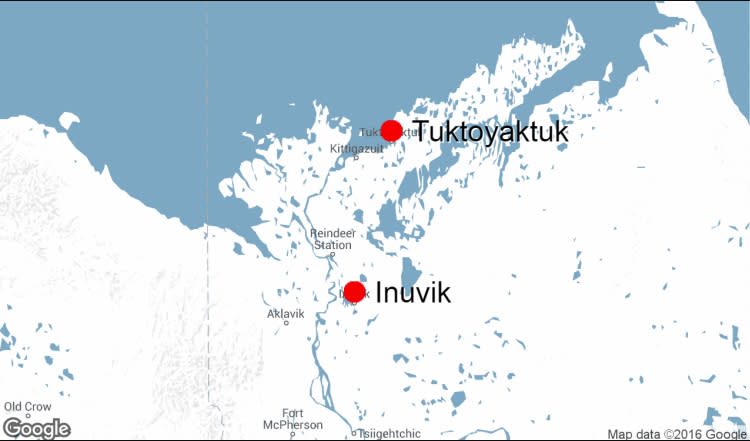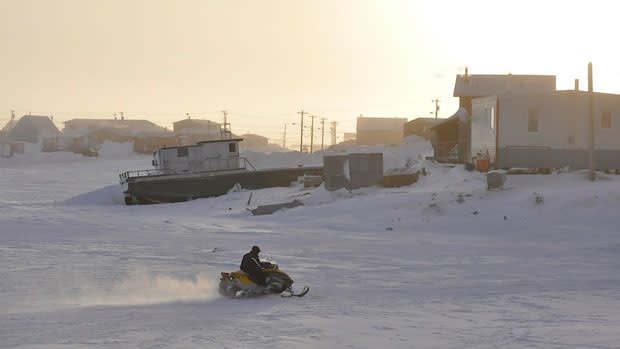Canada's new arctic highway to connect coasts and communities

A new highway will officially open in the Northwest Territories on Nov. 15, and it’s going to be a game changer for one small, isolated northern community.
While there are permanent, all-season roads criss-crossing the territories, and a network of ice roads resurfaces in the winter, there isn’t an all-season highway that connects the Hamlet of Tuktoyaktuk with another highway or community.
This will change with the opening of Canada’s first arctic coast highway, a 137-kilometre road will permanently connect Tuktoyaktuk — also known as Tuk — with the larger, more southern town of Inuvik.
It’s a piece of infrastructure that will open up the community – which, during summer months is only accessible by plane – like never before.
The idea of a Canadian arctic road has resurfaced periodically within different levels of government, but in 2013, the federal government committed to paying two-thirds of the $300-million cost as one of four Canada 150 signature infrastructure projects.
In a speech before the Legislative Assembly of the Northwest Territories, Wally Schumann, N.W.T. Minister of Industry, Tourism and Investment, championed the highway as a way to connect Canada’s three coasts and help strengthen Arctic sovereignty and resources development.
“Progress to construct the Inuvik Tuktoyaktuk Highway is exciting to observe,” he said. “Once complete, Northerners will have contributed to fulfilling a vision of Canada connected by road from coast-to-coast-to-coast.

A portrait of Tuktoyaktuk
While expanded roadways are usually a boon to communities, for residents of Tuk, the new highway could represent a lifeline.
Tuktoyaktuk is a very small community, and its isolation can not be understated. Situated north of the Arctic Circle on the shore of the Arctic Ocean, it is home to 900 people. A third of its population is under the age of 15.
While it was once a base for the oil and natural gas exploration of the Beaufort Sea, its main industries now are tourism and transportation. Many locals still rely on hunting, fishing and trapping. Its population is mainly Inuit.
There is a health centre in Tuk, but the nearest hospital is in Inuvik, a 300-minute, several-hundred-dollar plane ride south. The hope among politicians and Tuk residents is that the new arctic highway will give the population better access to healthcare and better opportunities to travel, and will strengthen their connection to the rest of Canada.
“Expanding our transportation system will help us connect residents to new social and employment opportunities,” Schumann said, “increase our resiliency, adapt to the impacts of climate change and provide better access to natural resources.”
Because its isolation makes for exorbitant food prices — particularly for produce and perishable items — Schumann said reliable all-season access could also “stabilize the cost of living” in the territory.
While the highway will make it easier for residents to leave Tuk, the community hopes it will also make the hamlet a more desirable destination for non-locals.
Construction of the highway created 400 temporary jobs, but with building complete, Tuk is looking to create permanent jobs — and lower its unemployment rate, which currently sits at 30 per cent — by shoring up its tourism industry. So the community has a plan to beautify Tuk and establish more tourist attractions.
“While construction of the highway has already benefited the region’s economy, this is only the beginning,” Schumann said.
“Through the Department of Industry, Tourism, and Investment our government is working to position residents and businesses in the Beaufort Delta region to capitalize on economic opportunities from year-round road access.”
Despite a generally optimistic outlook, CBC News reports residents also feel uneasy about the kinds of change the highway might usher into the community. While Tuk’s isolation limits locals’ freedom of movement, some feel that isolation has also sheltered locals from outside influences like drugs and alcohol.
While only time will tell exactly how Canada’s new arctic highway impacts the community, no one seems to deny that more change is en route.
Tuktoyaktuk Mayor Darrel Nasogaluak could not be reached for comment by publication deadline because, in addition to being the community’s leader, he has a full-time job.


